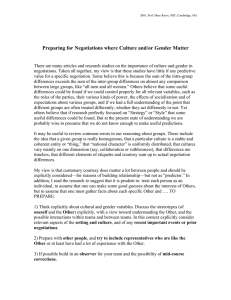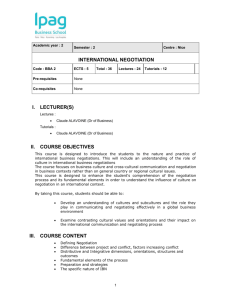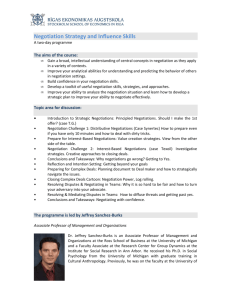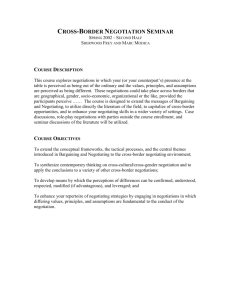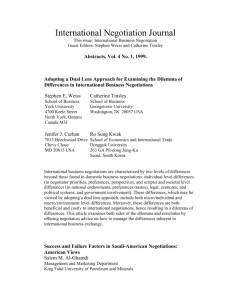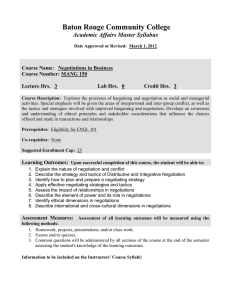POL 190 Diplomacy and Negotiation Term Paper—Instructions and
advertisement
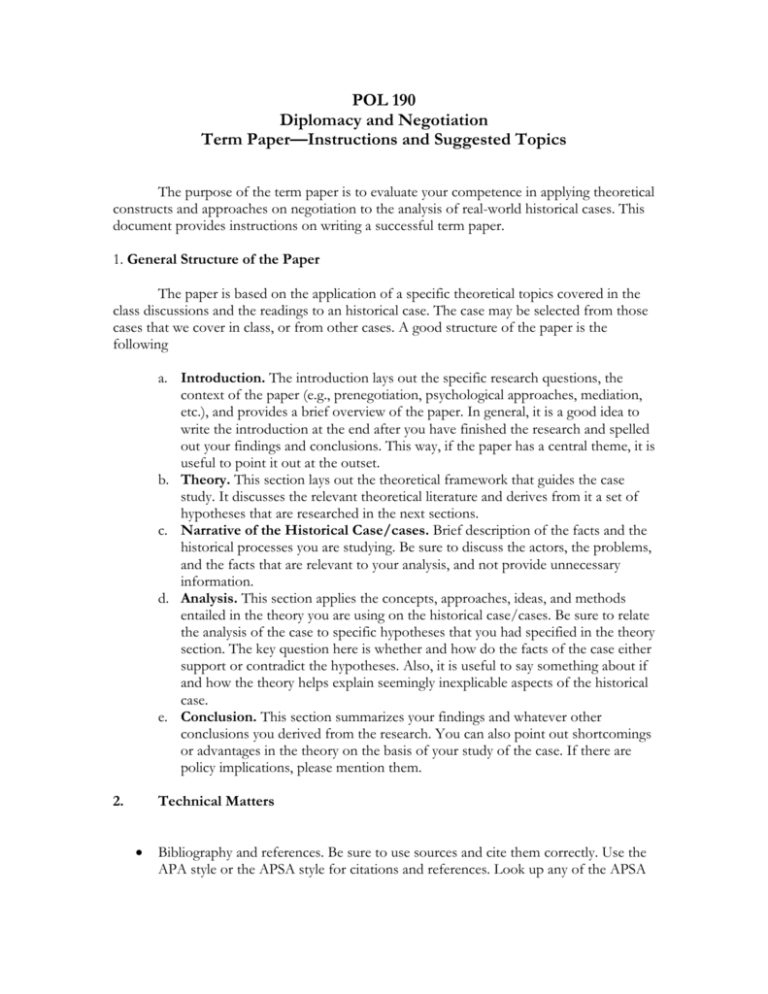
POL 190 Diplomacy and Negotiation Term Paper—Instructions and Suggested Topics The purpose of the term paper is to evaluate your competence in applying theoretical constructs and approaches on negotiation to the analysis of real-world historical cases. This document provides instructions on writing a successful term paper. 1. General Structure of the Paper The paper is based on the application of a specific theoretical topics covered in the class discussions and the readings to an historical case. The case may be selected from those cases that we cover in class, or from other cases. A good structure of the paper is the following a. Introduction. The introduction lays out the specific research questions, the context of the paper (e.g., prenegotiation, psychological approaches, mediation, etc.), and provides a brief overview of the paper. In general, it is a good idea to write the introduction at the end after you have finished the research and spelled out your findings and conclusions. This way, if the paper has a central theme, it is useful to point it out at the outset. b. Theory. This section lays out the theoretical framework that guides the case study. It discusses the relevant theoretical literature and derives from it a set of hypotheses that are researched in the next sections. c. Narrative of the Historical Case/cases. Brief description of the facts and the historical processes you are studying. Be sure to discuss the actors, the problems, and the facts that are relevant to your analysis, and not provide unnecessary information. d. Analysis. This section applies the concepts, approaches, ideas, and methods entailed in the theory you are using on the historical case/cases. Be sure to relate the analysis of the case to specific hypotheses that you had specified in the theory section. The key question here is whether and how do the facts of the case either support or contradict the hypotheses. Also, it is useful to say something about if and how the theory helps explain seemingly inexplicable aspects of the historical case. e. Conclusion. This section summarizes your findings and whatever other conclusions you derived from the research. You can also point out shortcomings or advantages in the theory on the basis of your study of the case. If there are policy implications, please mention them. 2. Technical Matters • Bibliography and references. Be sure to use sources and cite them correctly. Use the APA style or the APSA style for citations and references. Look up any of the APSA Term Paper 2 journals (American Political Science Review, American Journal of Political Science, Journal of Politics, etc.) for examples. 3. • Style. Spend some time thinking on how to organize your paper, how to present your arguments, how to support them, and how to conclude. A well written paper makes for a better grade than a poorly written one. • Questions. I encourage creativity in writing, but to be on the safe side, check with me any ideas that you think are not really of a standard form that you want to put in your paper Examples of topics for term papers 1. Pre-Negotiations in the Hitler Crises: Location, Timing, and Agenda 2. Does the Norm of Reciprocity Apply to War Termination? Comparing the Vietnam Negotiations with the Israeli-Egyptian Negotiations after the 1973 War 3. A Game Theoretic Analysis of the Anschluss Crisis of 1938. 4. A Game Theoretic Analysis of the Camp David Summit of 2000 5. Coalition Building in the Gulf Wars: Comparing the 1990 process to the 2002 process. 6. Personality and Negotiation Style: Comparing Sadat and Begin 7. Personality and Negotiation Style: Kissinger in the Middle East Negotiations, 1943-1975. 8. Cognitive Biases in Negotiations: The Munich Crisis of 1938 9. Cognitive Biases in Negotiations: the 1994 U.S-North Korean Agreement and its implementation 10. Can Mediators be Unbiased and Should they Be? Bill Clinton at the 2000 Camp David Negotiations 11. The Process of Mediation—What affects success: Comparing Carter to Clinton in the Arab-Israeli case 12. How Stress Affects Negotiation: Hostage cases (e.g., U.S. Hostages in Lebanon, the Mayaguez Incident; the Entebbe Crisis in Israel in 1976). 3. Other theoretical topics and/or different historical cases are perfectly acceptable. However, be sure to check with me, via email or by coming to my office hours that your specific topic (if not on this list), is on track. Good Luck


